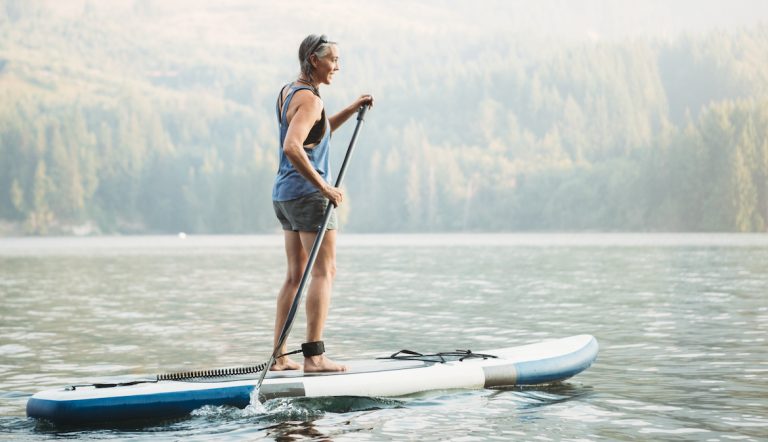
[ad_1]
Slathering on sunscreen before an outdoor workout is an essential part of safe sun practices. But it can come with an unpleasant side effect: Sunscreen dripping into your eyes as soon as you start to sweat. If you’ve ever experienced this, you know it can seriously sting.
Before you consider skipping SPF—or your outdoor workout—know this: There are a few dermatologist-recommended hacks you can try to keep your sunblock away from your eyes.
But why in 2023 do we even still have to deal with this sunscreen-in-eyes situation? “Generally, sunscreens in the U.S. have been formulated for a certain feel and finish on the skin,” says Teo Soleymani, MD, a dermatologist at UCLA Health. “Over the past 20 to 30 years, the cosmetics industry has been big on finding products that are stackable with makeup and other products, or things that feel weightless or invisible on your skin.”
There’s also been a premium on sunscreens that are non-comedogenic, i.e. that won’t clog your pores, he says.
There’s a downside to all of this, Soleymani says: It tends to make sunscreens thin and water-soluble—meaning, they’re more likely to run when you sweat or get wet. “Whenever we look to make products that won’t clog your pores and will be weightless, it limits the ability to create a product that’s not easily rinsed off,” Soleymani says. “But what’s your body’s best rinse? Sweat that comes out of your pores.”
That brings us to what, exactly, you can do to keep your sunscreen in place and out of your eyes. Soleymani has a few suggestions.
Use a sport sunscreen
The name isn’t just for show—these sunscreens are actually formulated differently than others, Soleymani says. “It’s the same concept as waterproof mascara,” he says. “It’s formulated in a way that adheres to your skin a little better and is a little less hydrophilic—water loving—so it won’t slough off with your sweat.”
Reconsider chemical sunscreens
As a whole, chemical sunscreens, such as those with ingredients like avobenzone, “tend to be less effective at being water resistant than mineral-based sunscreens,” Soleymani says. If you typically sweat a lot during workouts, it’s best to avoid using these on your face.
Reach for mineral sunscreens
Mineral sunscreens are typically thicker than their chemical counterparts, but that’s a good thing when you’re trying to prevent them from sweating off. “They don’t run. Mineral-based sunscreens tend to stick a lot better because of the zinc and titanium used,” Soleymani says. “The only annoying part of them is that they stay on your skin for a long time.” (His pro tip for removal: Try makeup remover wipes to get the sunscreen off at the end of the day or when you’re washing up after your workout.)
Consider UV shield glasses
In case you’re not familiar with them, UV shield glasses block UV rays and tend to cover a larger area of your face than your standard sunglasses. If you pair them with a hat, you could potentially shield the upper half of your face from the sun without needing to use much sunscreen in that area. “A lot of baseball or tennis players wear them,” Soleymani says. “That can provide a good amount of UV protection without necessarily needing to cake on a layer of sunscreen.”
Look into zinc oxide sunscreen
Zinc oxide sunscreen is what lifeguards used to smear on their noses and under their eyes in the ‘80s and ‘90s to offer strong sun protection. “That was really effective and would not run with water or sweat,” Soleymani says. “The only thing people didn’t like was that it was very noticeable.” Fortunately, zinc oxide sunscreen has progressed since then, and some companies now offer products that go on clear. Soleymani says it’s worth at least considering using this around your eyes to both protect your skin and create a barrier.
Overall, Soleymani recommends just being “practical” when you’re working out in the sun. “Be sensible,” he says. “If you’re going to be out for more than 20 minutes at a time during high UV index times—10 a.m. to 2 p.m.—wear sunscreen. And, if you’ll be out for more than an hour, reapply.”
[ad_2]
Source link